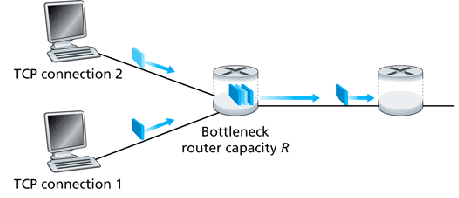Week 1-Part 1: TCP Backoff
April 20, 2016

If you got a popup like this, you’d probably be hesitant to download whatever program it leads to. But what if it actually worked?
If two people want to communicate over the internet, a message gets broken down into packets, much like envelopes, delivered across the internet. i.e. You don’t have a direct connection to your recipient. Much like real mail, the message must pass through a sequence of computers along the way who pass the message to the next. Once the message is delivered to the recipient, the recipient sends back an acknowledgement to you also through a sequence of computers until it gets back to you.
Sometimes a computer in this sequence is overwhelmed with messages. It handles this congestion by throwing away some of the messages without telling anyone until it can handle what’s left and then only works with those. Your computer waits a certain amount of time and if it doesn’t hear back, it assumes that the message didn’t get delivered and sends it again.
The important part (the game theory aspect) is what the computer does next: It slows down the speed at which it sends messages in the future, and assumes that there is some congestion somewhere in the network. Kind of like a crash on a highway, the only way for cars to reach their destination at a reasonable time is to limit the number of cars (or messages) on the highways (computers). This is called TCP backoff.
(1.0) Question
Should you install the program from the popup if it intends to remove this speed limitation (therefore ignoring the slowdown orders and possibly congesting the computers the message will route through)? This question can be answered using game theory.
(1.1) Definition: A Game
A game in general is any interaction between two or more people where the outcomes of the interaction depend on what everybody does and everybody has different levels of happiness for the different outcomes.
(1.2) Definition: Two Player Game
The above problem can be simplified to be an example of a two-player game (This scales naturally to far more players):
Assume two internet users get the popup allowing them to either continue with the computer regulating traffic to the benefit of everyone, or instead install a program which disables this regulation and always sends packets as fast as possible (with the risk of congestion). Should a player install the program?
- If both players decide to not install the program, and allow their computer to slow down to optimize traffic, both players experience a 1 millisecond delay

- If one player decides to install the program, and the other doesn’t, the player with the program will experience a 0 millisecond delay, flooding the network with packets and the player without the program will experience a 4 millisecond delay since their computer will slow down to compensate for the added traffic
- If both players install the program, then they both will flood the network with TCP packets, making it more likely for a computer in the network to lose a message. This forces both players to experience a 3 ms delay.
Here are some important questions to ask:
- Do you expect all users to behave the same in a situation like this?
- If you are simply observing (e.g. the designer of the network), what sorts of patterns of behaviour would you expect to see emerge?
- What action should a player of the game take?
- What effect would there be if players were able to communicate before deciding (in a non-binding way)?
- What effect would repetition of the game (finitely or infinitely many) play in the outcome?
- How important is it to model the opponent (i.e. is the opponent rational? Is the choice that is in their best interest different from that of yourself/another player?)
Week 1: Self Interested Agents and Utility Theory
(1.3) Definition: Self-Interested
Self-interested does not mean that agents want to hard others/care about themselves. It means that an agent has its own description of states of the world that it prefers/likes, and acts based on that description.
Each agent has a utility function
(1.4) Definition: Utility Function
The utility function of an agent quantifies the degree (magnitude?) of preference across all possible options/alternatives. It describes their preferences towards a whole distribution vs a single stock value.
So for example, if you are told it will be 25 degrees out with probability 0.7, and 24 degrees with probability 0.3, you might have an opinion on that vs some other distribution.
The Decision-Theoretic approach that underpins game theory states that you will try to act in a way that maximizes your expected utility (the expected value of the utility function).